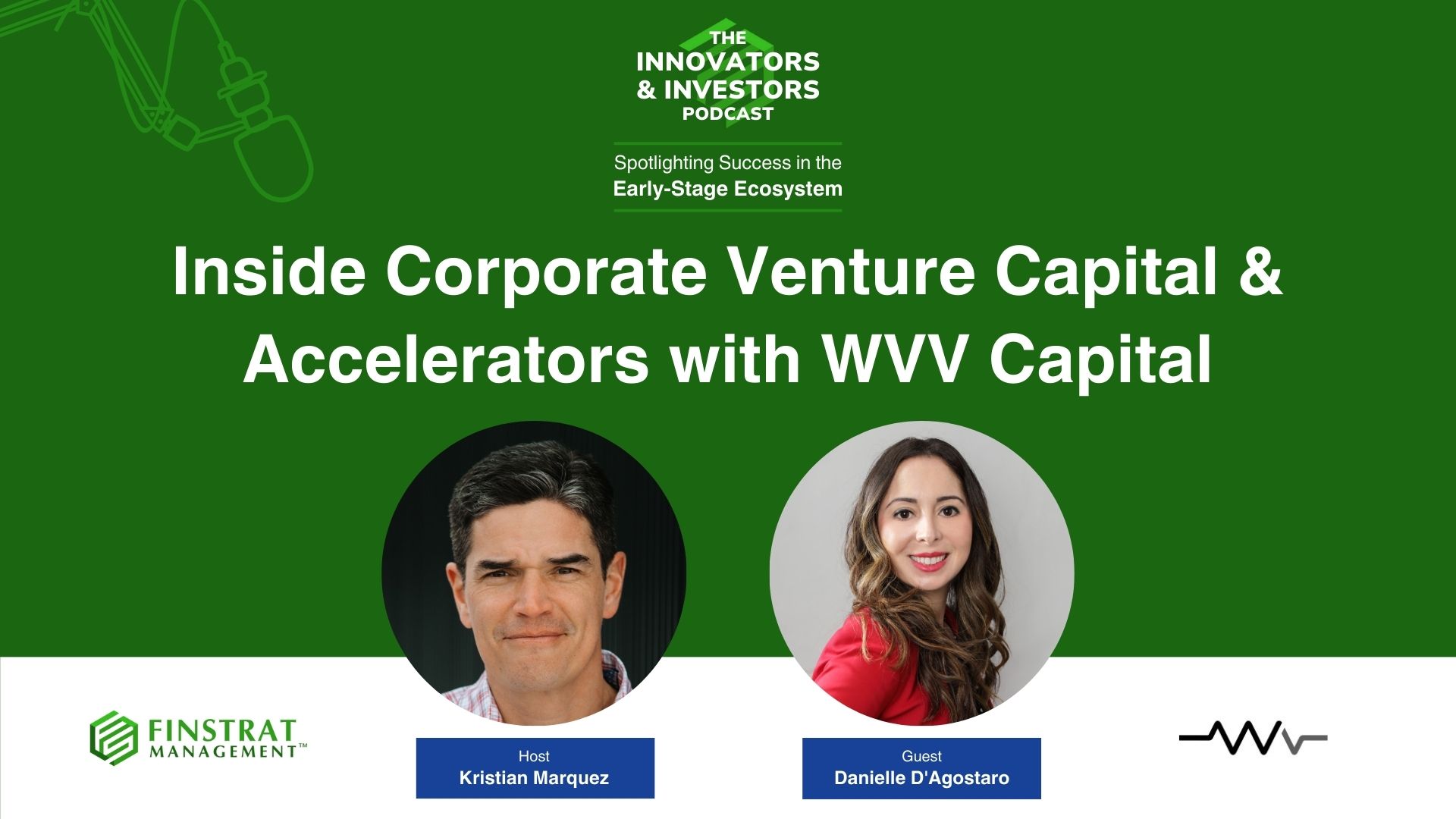Inside Corporate Venture Capital & Accelerators with WVV Capital
September 8, 2025 | 36 MIN

Highlights
- Danielle D’Agostaro co-founded Alchemist Accelerator and is a principal partner at WVV Capital, bridging startup acceleration and corporate VC.
- WVV Capital is a $100 million fund backed by four major corporates targeting sectors like healthcare, AI, prop tech, and sustainability with an economic development focus on the Midwest.
- Accelerators fill a crucial gap by integrating startups into established networks, providing early capital, and supporting founders in customer acquisition and fundraising.
- VC firms today expect more traction and proven business models, especially post-COVID and after valuation bubbles, making early-stage fundraising more challenging.
- Corporate venture capital has evolved from being seen as a “dirty word” to a valuable strategic partner, offering startups access to corporate resources and deal-making advantages.
- Demo days are becoming less effective as most big VCs prefer one-on-one relationship-driven deal flow; accelerators need to innovate their support models.
- Danielle advocates for founders to focus first on building sustainable businesses through customers, which naturally attracts VC interest over time.
Summary
In this episode of the Innovators and Investors Podcast, host Christian Marquez interviews Danielle D’Agostaro, co-founder and strategic advisor at Alchemist Accelerator and principal partner at WVV Capital. Danielle shares insights on her career journey, the unique investment thesis of WVV Capital, the evolving landscape of venture capital (VC) and accelerators, and the role of corporate venture capital (CVC) in today’s startup ecosystem. She highlights the value accelerators bring to early-stage startups, especially those outside major tech hubs, by providing networks, early capital, and operational support. Danielle also discusses the challenges startups face due to increased VC scrutiny and the need for traction, especially in B2B sectors where customer acquisition takes longer. She elaborates on the origins of WVV—a $100 million fund backed by four major corporates focused on economic development in the Midwest—and the advantages and complexities of corporate VC investments. Danielle stresses the importance of founders focusing on building sustainable businesses through customers, rather than chasing fundraising. She reflects on the limitations of traditional demo days, the evolving expectations of accelerators, and how Alchemist is adapting to better serve startups. Finally, she offers personal advice on career growth, emphasizing openness to unexpected opportunities, resilience, and the power of community and mentorship.
Key Insights
- WVV’s Hybrid Investment Model Balances Strategic and Financial Goals: WVV Capital is unique because it is backed by four corporates from diverse sectors, serving them equally by investing in companies that provide both strategic value and financial returns. This hybrid model allows for cross-sectoral investment opportunities, especially in emerging areas like AI, which have broad applicability. The fund’s origin in economic development for Milwaukee and Chicago areas also highlights how corporate VC can align with regional growth objectives, bringing capital and jobs outside traditional tech hubs.
- Accelerators as Gateway Networks for Non-Silicon Valley Startups: Danielle emphasizes that accelerators offer critical access to the social and financial networks that startups outside major tech ecosystems often lack. By immersing founders in these networks, accelerators reduce geographic and social barriers, offering community, mentorship, and early capital. This democratization of startup opportunity is vital in diversifying innovation beyond Silicon Valley.
- Shift in VC Expectations Post-2021 Bubble: The venture capital landscape has tightened significantly, with investors demanding more traction, customer validation, and less speculative “moonshot” risk. This is driven by poor returns from prior investment vintages inflated by high valuations and limited liquidity events. For early-stage startups, especially in B2B, this means longer bootstrapping periods and a need to demonstrate measurable progress before securing substantial VC funding.
- Challenges of B2B Startups in Early Fundraising: Unlike consumer-focused startups, B2B companies often require longer sales cycles and customer development phases. Danielle points out that this makes early-stage fundraising challenging since many VCs now expect startups to show significant traction before investing. Accelerators can help bridge this gap by providing early-stage capital and operational support, but founders must still focus heavily on customer acquisition.
- Corporate VC’s Evolving Role and Value Proposition: Corporate venture capital has transitioned from being viewed skeptically to becoming a strategic partner that values reputation and meaningful deal flow. Danielle explains that many corporate investors do not prioritize carry, but rather seek strategic alignment and long-term value creation. Having corporate investors can be invaluable for startups looking to close deals within those corporations, providing insider access and credibility.
- Limitations of Demo Days in Current VC Ecosystem: Traditional accelerator demo days, where many startups pitch to a crowd of investors, are less effective in the current environment. Top-tier VCs prefer deal flow through trusted relationships and one-on-one conversations rather than mass pitches. Consequently, accelerators need to rethink how they deliver value to startups, focusing on creating deeper investor connections rather than broad but shallow exposure.
- Founder Advice: Focus on Customers Before Fundraising: Danielle stresses that founders should prioritize building a sustainable business by acquiring customers and refining their product-market fit before focusing on fundraising. The VC ecosystem will naturally find promising startups if they demonstrate real market success. This mindset helps founders avoid pitfalls of overemphasizing capital raising at the expense of business fundamentals.
Additional Observations
- Danielle’s career path—from aspiring marketing VP to operator to VC—is a testament to the value of adaptability, openness to new opportunities, and self-teaching. She underscores that career plans provide direction but letting go of rigid plans enables unexpected and rewarding paths.
- The role of government partnerships and international collaborations (e.g., Japan, Memphis programs) in accelerators like Alchemist highlights the growing importance of cross-border innovation support and economic development strategies.
- The discussion about portfolio management principles in VC—balancing the number of investments to maximize returns while accepting inevitable failures—provides a practical view into fund strategy often misunderstood by founders.
- Danielle’s insight about the need for accelerators to evolve their programming to reflect changes in startup ecosystems and investor behavior signals a broader trend that could reshape early-stage startup support models going forward.
- The emphasis on mentorship and community, both in Danielle’s own career and in accelerator culture, highlights the intangible but critical factors behind startup success beyond just funding and product.
Overall, this episode offers a comprehensive and nuanced view of how accelerators and corporate venture capital are adapting to new market realities, and practical guidance for founders navigating today’s complex startup funding environment.
Stay up-to-date with Danielle D’Agostaro and her work with WVV Capital and Alchemist Accelerator.

Follow the show on your podcast channel of choice or listen below.



